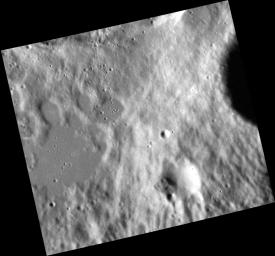
|
Feeling a Bit Rough?
- Click the image above for a larger view
- Full-Res JPEG (1358 x 1262) (179.1 kB)
- Full-Res TIFF (1358 x 1262) (1.7 MB)
Caption:
The image above shows the continuous ejecta from an unnamed crater that is just outside of the frame to the north, located on the rim of Soseki crater. A pond of solidified impact melt appears smooth compared to the rough ejecta deposit . Impact melt is often found in substantial volumes outside of a crater rim when the parent crater forms on a slope, such as that of Soseki's rim, which allows melt to escape downslope.
This image was acquired as a high-resolution targeted observation. Targeted observations are images of a small area on Mercury's surface at resolutions much higher than the 200-meter/pixel morphology base map. It is not possible to cover all of Mercury's surface at this high resolution, but typically several areas of high scientific interest are imaged in this mode each week.
Date acquired:
October 13, 2012
Image Mission Elapsed Time (MET):
258602268
Image ID:
2756208
Instrument:
Narrow Angle Camera (NAC) of the Mercury Dual Imaging System (MDIS)
Center Latitude:
37.24°
Center Longitude:
321.4° E
Resolution:
21 meters/pixel
Scale:
This image is 25 km (16 mi.) across.
Incidence Angle:
73.2°
Emission Angle:
27.3°
Phase Angle:
100.5°
Background Info:
The MESSENGER spacecraft is the first ever to orbit the planet Mercury, and the spacecraft's seven scientific instruments and radio science investigation are unraveling the history and evolution of the Solar System's innermost planet. MESSENGER acquired over 150,000 images and extensive other data sets. MESSENGER is capable of continuing orbital operations until early 2015.
For information regarding the use of images, see the MESSENGER image use policy .
Cataloging Keywords:
| Name | Value | Additional Values |
|---|---|---|
| Target | Mercury | |
| System | ||
| Target Type | Planet | |
| Mission | MESSENGER | |
| Instrument Host | MESSENGER | |
| Host Type | Orbiter | |
| Instrument | Mercury Dual Imaging System (MDIS) | |
| Detector | Narrow Angle Camera (NAC) | |
| Extra Keywords | Crater, Grayscale, Impact, Map, Radio | |
| Acquisition Date | ||
| Release Date | 2013-04-03 | |
| Date in Caption | 2012-10-13 | |
| Image Credit | NASA/Johns Hopkins University Applied Physics Laboratory/Carnegie Institution of Washington | |
| Source | photojournal.jpl.nasa.gov/catalog/PIA16947 | |
| Identifier | PIA16947 | |
